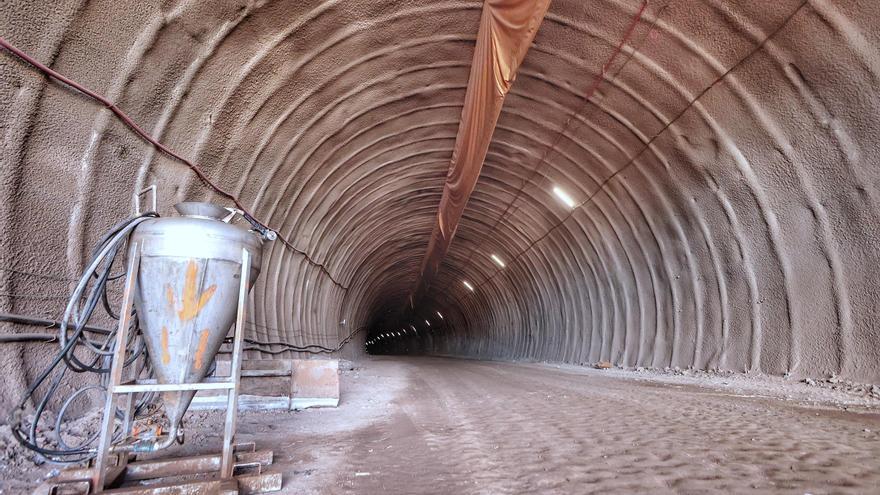
The High Court of Canary Islands (TSJC) has cancelled the award granted by the regional Government for the completion of the Insular Ring between Santiago del Teide and El Tanque, for excluding the bid from the Joint Venture (JV) Obrascon Huarte Lain, SA-Sociedad Anónima-Trabajos y Obras-Excavaciones Bahillo, SL-Asfaltos Bahillo, SL. Consequently, the JV OHL becomes the awardee as the Court reaffirms the directive issued by the Minister of Public Works of the acting government of Coalición Canaria, Pablo Rodríguez, on June 4, 2019.
The JV FCC appealed this directive to the Administrative Tribunal for Public Contracts of the Autonomous Community, which ruled in their favour and compelled Sebastián Franquis, Minister of Public Works, Transport and Housing of the so-called flower pact (PSOE, Nueva Canarias, Yes We Can and Agrupación Socialista Gomera), to apply it and reassign the work. FCC has been carrying out the work since November 2019 for €240,370,796, although the current cost has risen to €263.5 million due to price adjustments, making it the most expensive project undertaken by the Canary Islands Government. It includes the Erjos Tunnel and is expected to be completed by mid-next year.
The JV OHL challenged the decision of the Administrative Tribunal for Public Contracts of the Autonomous Community (September 26, 2019) and the execution directive (September 30, 2019) of the Minister of Public Works, Transport and Housing, Sebastián Franquis, to exclude the bid “for not meeting the labour and salary requirements set out in the Construction Collective Agreement for the province of Tenerife“. A decision based, among other things, on a contracting body report that “contains errors,” as stated in the ruling.
The Ruling
[–>
The TSJC determines that “there is no evidence of such non-compliance with labour regulations regarding worker compensation, Social Security contributions, or occupational health and safety regulations”. The Court believes that this is, “in any case, an interpretative and technical aspect of the bid to which the JV-OHL provides sufficient justification.”
The ruling, issued on the 14th of the past month, confirms that the JV OHL included a labour cost of €14,277,522 in their bid, an amount that, as acknowledged by the Government of the Canary Islands, “exceeds by more than two million euros the minimum personnel costs calculated according to the agreement [€12,276,789.11]”. In the detailed evaluation of this stage of the tender, the TSJC notes certain discrepancies.
First Award
[–>
The bidding base budget for the project named Update of the construction project: new project for the El Tanque-Santiago del Teide section (closure of the Tenerife insular ring) was €365,756,887.37, with a construction budget of €254,715,996.06. The JV OHL bid €213,491,998.19 (€152.2 million less than the tender price), making it the highest-rated among the six competing companies. However, it was “presumed abnormal.” Following the required justification and detailed breakdown of the bid, the Contract Committee affirmed the feasibility and proposed awarding the contract to the JV OHL for the bid amount. This proposal was executed with the directive signed by the Minister of Public Works and Transport of the Government of the Canary Islands, Pablo Rodríguez, on June 4, 2019.
Second Award
[–>
This first award was challenged by the JV FCC Construcción, Syocsa-Inarsa, and El Silbo (current executor of the work), claiming that allegedly the awardee’s bid violated the regulations on disproportionate low bids and breached labour laws regarding remuneration and maximum annual working hours. The Administrative Tribunal for Public Contracts of the Autonomous Community –based on reports from the Projects and Works manager, the Roads section head, and the Legal Economic section head– ruled in their favour and adopted the legal report which stated that the JV-OHL bid “should have been rejected.” Nevertheless, the ruling delves into another aspect of the same report referring to non-labour-related issues that lead it to conclude “that the economic bid made remains viable, enabling the execution of the works intended to be awarded.” The second award took place on October 18, 2019.
The TSJC deems “irrelevant” the Canary Islands Government’s attempt to justify the exclusion of the JV OHL from the tender on the grounds of not justifying €1,764,021.74 in labour costs for surveyors, supervisors, and maintenance staff. The Court decisively states: “JV-OHL would still meet the minimum labour costs as per the agreement”.
Surveyors
The ruling clears up any doubts about the inclusion of “eight surveying teams” in the tender submitted by the UTE OHL, although they justified five surveyors as labour costs, two of them specifically assigned to the tunnel. The Court acknowledged this discrepancy, clarifying that “the technicians always considered it feasible. Even the experts from the parties consider that it was not technically necessary to have eight surveyors working exclusively in the tunnel to carry out the work.
OHL did not incur in reckless bidding either. The First Section of the Administrative Litigation Court ruled that “we have not considered” the bid to be “abnormally low for violating labour regulations”. Only a deficit of €13,200 was identified in relation to the costs of structure managers, an insignificant amount compared to the total labour costs of the bid, which amounted to €14,277,522, exceeding the minimum required by the agreement (€12,276,789.11).
The TSJC imposes costs equally on the Government of the Canary Islands and the company carrying out the closure of the island ring road between Santiago del Teide and El Tanque, the UTE FCC Construcción, Syocsa-Inarsa and El Silbo, which is listed as a codefendant in this case. Since the issuance of the ruling (on the 14th), the regional Executive and FCC can file an appeal in cassation before the same court.
Codefendant
The UTE FCC Construcción, Syocsa-Inarsa and El Silbo, codefendant of the UTE OHL, coincided in their arguments with those defended by the Canary Islands Government, with a special emphasis on the non-compliance with labour regulations, which the TSJC discarded. FCC even cited the technical-economic report prepared at the request of the Administrative Tribunal for Public Contracts of the Autonomous Community, which is part of the case, to ensure that this allowed OHL to “improperly reduce its costs and consequently lower its price”.
The Project
On November 25, 2019, the construction of the closing section of the Tenerife Ring Road began, connecting the Northern Highway (TF-5) in El Tanque with the Southern Highway (TF-1) in Santiago del Teide. This road will provide continuity to the extension of the Southern Highway between Adeje and Santiago del Teide, as well as between Icod de Los Vinos and El Tanque, on the west side of the island. This new section of the road network will be 11.3 kilometers long and will connect the northern and southern corridors of Tenerife with a safer and higher capacity road than the current TF-82. It will save drivers over 45 minutes compared to the current road used to connect both regions.
Erjos Tunnel
The most important part of the project is the construction of the Erjos Tunnel. This underground work, consisting of two parallel tubes, each 5.1 kilometers long, runs beneath the Teno Massif. It is the longest tunnel in the Archipelago and the third in the country, surpassed only by the Manzanares (5,973 metres) in Madrid and Viella (5,260 metres) in Lleida.
Each tunnel mouth is 4,885 metres long. In both, two false tunnels of 140 metres on the South side and 100 metres on the North side must be added to reach the project’s planned 5.1 kilometers. Studies estimate that it will take between seven and ten minutes to travel through it at a maximum speed of 80 kilometers per hour. It has 19 communication points (every 500 metres) between both tubes as a safety measure. There is a height difference of 150 metres between the starting point of the tunnel in Santiago del Teide and the exit in El Tanque.
On October 7, 2020, a team of 70 workers began excavating the two tunnel mouths of Erjos. The drilling of the first of the tubes (the one on the right from Santiago del Teide) was completed on June 26, 2023; in October, the opening of the second tube was also completed.
The Route
This new section of the Tenerife road network starts in the municipality of El Tanque, at an altitude of 600 meters, just where the previous subsection that runs between Buen Paso (Icod de los Vinos) and El Tanque ends. From here, the route bypasses this town to the South until it intercepts the main road TF-82 at Barrio Nuevo, crossing through an artificial tunnel, from where, as it ascends, it begins to turn south to pass between Lomo Morín (Los Silos) and the Nogueros area (El Tanque), where the north mouth of the Erjos Tunnel is located, approximately one kilometre west of the town of Ruigómez (El Tanque) and at an altitude of 775 metres.
The southern mouth is located in Santiago del Teide, where the new road runs along the southern edge of the urban area until it connects with the southern section of the Ring Road, which leads to the Las Manchas area.
Four Lanes
It turns out that this new 11.3-kilometre road only has four lanes in the Erjos Tunnel (two at each mouth). The rest of the route is a single carriageway 3.50 meters wide in the open air. This is one of the aspects being corrected concerning the original project. The Department of Public Works is already working to develop a project modification in order to provide the road with four lanes along the entire route.
Regarding the structures included in this project, nine are being carried out: a viaduct, an artificial tunnel to bypass the population centre of Barrio Nuevo (El Tanque), four underpasses, and two overpasses to cross the road with several paths or roundabouts, as well as a pedestrian walkway that will be used to maintain the Virgin of Lourdes Path (included in the Almond Blossom Route) from Santiago del Teide. There are 28 drainage works and 11 walls, as well as two junctions, one in El Tanque and the other in Santiago del Teide.
With two lanes in each direction, the forecast from the Department of Public Works, Transport and Housing is that in the year of the opening (2025) of the motorway section between Santiago del Teide and El Tanque, there will be a daily traffic volume of 17,000 vehicles, much higher than the initially proposed 5,000. Over a decade, it is projected to reach 30,000 vehicles per day. The time saved by users travelling from the North to the South on this road will be 20 minutes with smooth traffic, according to the regional government.
















